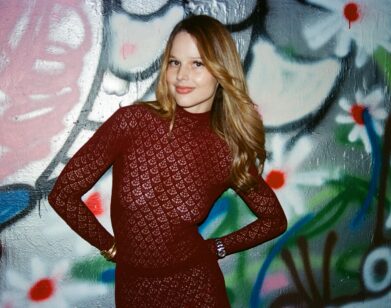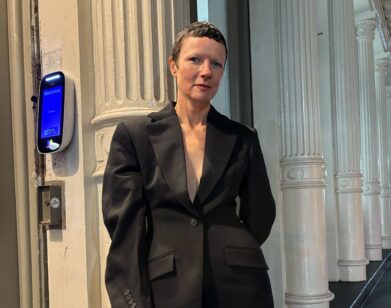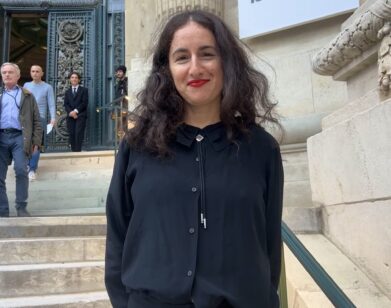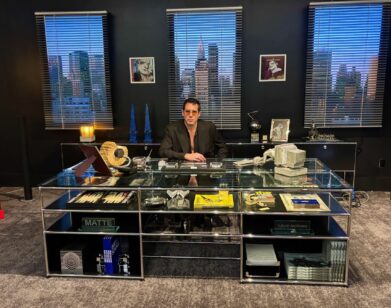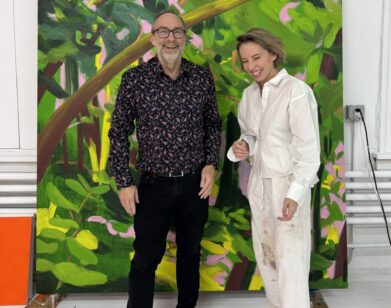Anna Paquin
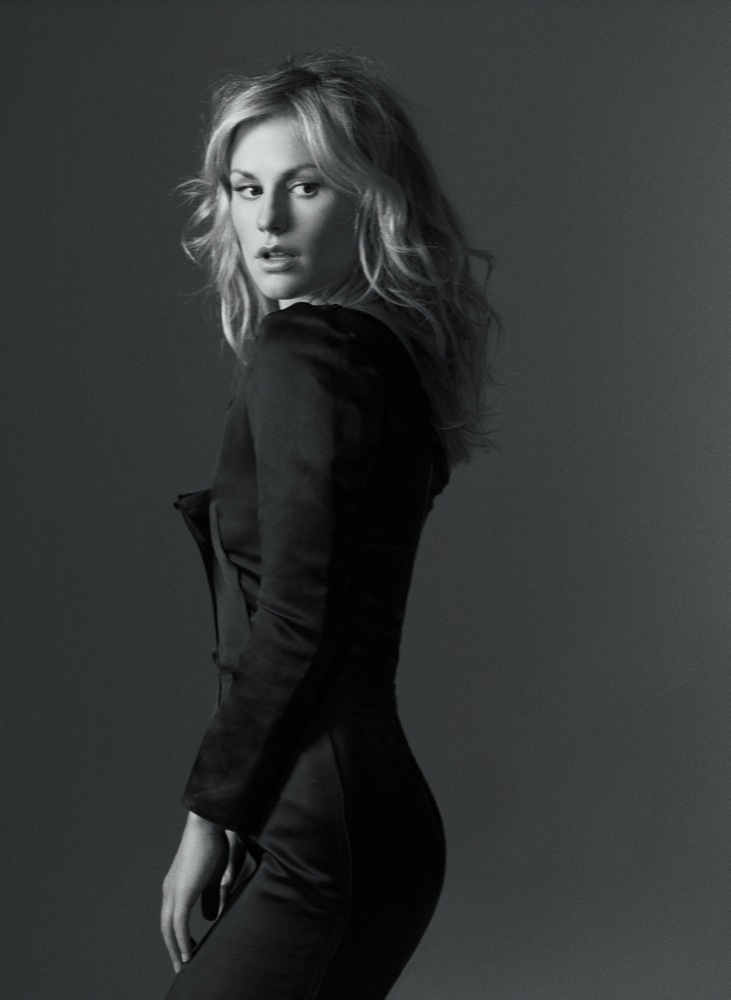
Anna Paquin was 11 years old when she won her Oscar for Best Supporting Actress for her role in 1993’s The Piano. That made her the second-youngest Academy Award winner in a competitive acting category in history. Her career since has also been fairly memorable: She’s worked with directors like Steven Spielberg, Bryan Singer, and Gus Van Sant; showed up with superpowers in three X-Men movies; and driven home complicated characters in indies like Hurlyburly (1998) and The Squid and the Whale (2005). Paquin has also taken to the stage, starring Off Broadway in a Neil LaBute drama, in a London production of This Is Our Youth, and in The Glory of Living directed by Philip Seymour Hoffman.
Basically, Paquin, at 26, has done everything an actor can do except for a regular TV gig. Until now. Currently, she’s starring in the new HBO series True Blood, a darkly sexy take on vampires who live among humans in the swamps of Louisiana. Paquin plays Sookie Stackhouse, a backwater waitress with an endless supply of short shorts and peroxide, who forms an unlikely alliance with a 173-year-old vampire (played by the British actor Stephen Moyer, who looks like the love child of Michael Vartan and Paul Rudd). Based on the popular Southern Vampire Mysteries series of pulp novels by Charlaine Harris, the show is executive-produced by Six Feet Under creator Alan Ball, and it shows his trademark wit and grit-and plenty of bare boobs, both male and female, for good measure.
In her spare time, Paquin runs the indie production company Paquin Films with her brother, Andrew, in Los Angeles. Their first feature film, Blue State, premiered last year. She’ll star next in Margaret, a psychological drama by Kenneth Lonergan (the Oscar-nominated screenwriter of 2000’s You Can Count on Me) about a girl who believes she caused a bus accident. But for now, on the subject of those short shorts and staying on this side of the human-vampire divide . . .
MICHAEL MARTIN: Are you in L.A. right now?
ANNA PAQUIN: I’m in New York, actually. I have friends and a life here, so I’ve just been hanging out, which is awesome.
MM: Do you have an apartment here?
AP: No, I’m staying in hotels, which is kind of weird. My lease was up right about the time I had to go out to Los Angeles to do True Blood.
MM: Why did you get involved with the show?
AP: Alan Ball is a massive hero of mine. I had worked previously for HBO [on the movie Bury My Heart at Wounded Knee (2007)] and had an amazing experience. The script I read was incredibly funny, sexy, odd, and weird, and the characters were really amazing; I just fell in love with it.
MM: Were you a fan of Six Feet Under?
AP: Huge. I’ve seen every episode at least two or three times. I love how real all of those relationships are, and how he depicts families but also weaves in these odd elements, like the figure of the dead father, in a way that’s not cheesy or crazy. He can make you believe things even if they’re not 100 percent based in reality. When he’s directing or on set, he’s like the favorite parent. It’s like –Everybody Loves Alan. Even if it’s 4 A.M. and everyone’s covered in mud and blood and whatever, he still keeps everyone having a good time.
MM: You’ve done a lot of theater and movies. Why did you want to go into TV?
AP: You get to actually develop the characters past an hour and a half. You get episode after episode of really interesting writing that makes you go to more and more complex places and you really get deep into a part-ugh, that’s a vampire pun; that’s terrible. But I really liked the idea of focusing on one thing for, hopefully, a long time to come. I also like the idea of a consistent lifestyle, as opposed to not really knowing where on the planet you’re going to be at any given moment.
MM: Were you a fan of vampire movies?
AP: Not really. I don’t think I’ve ever really seen one.
MM: Did you do any research before slipping into the shoes of Sookie?
AP: We all had to learn Southern accents. It wasn’t a big research show. With the Wounded Knee project, I locked myself in my apartment with history books so I would know what we’re talking about. But this was less about that and more about getting into that world and the energy of it. It was easy.
MM: But you did learn a Southern accent.
AP: No. I’m currently speaking to you in the accent that was learned. [She speaks in Californian with a tinge of the Valley.]
MM: I was going to say, I’m surprised you don’t have a New Zealander accent.
AP: I do when I speak to my mother and my sister and anyone else in my family. I’m bilingual.
MM: I read you appeared on a panel for True Blood at Comic-Con in San Diego last July. I’ve heard that experience can be kind of intense.
It’s kind of surreal when there are grown-ups who look like they have serious day jobs, dressed in full-on regalia of some creature or character, asking you a really serious question about the scenes of homosexualityand discrimination in your show.Anna Paquin
AP: Intense does not begin to describe it. It’s kind of surreal when there are grown-ups who look like they have serious day jobs, dressed in full-on regalia of some creature or character, asking you a really serious question about the scenes of homosexuality and discrimination in your show. And you’re like, “You’re dressed like a superhero! And you’re asking really profound questions!” I somehow never ended up going to any conventions for the X-Men films. I’m not sure how I pulled that off. So the comic book contingent had no idea who I was.
MM: Your character in True Blood is telepathic. Do you have any psychic abilities yourself?
AP: Good old-fashioned female intuition. That’s about it.
MM: When’s the last time you used that?
AP: Um, I don’t think I’d be out of line in saying it’s just part of the way women interact with the world.
MM: Between this and X-Men, are you drawn to the supernatural?
AP: I’m drawn to doing interesting stuff at work. And some of the time with the supernatural, you get to do really crazy, fun things. But I’m not a big genre-fantasy gal, particularly.
MM: If you could have one supernatural power in real life, what would it be?
AP: Teleportation. The whole metal-detector, strip-search thing you have to do every time you take a flight is annoying. Understandable, but kind of a pain.
MM: Your character feasts on blood from a vampire’s arm in the first episode. Was that fun?
AP: It was a little gross, mostly, in that case, because the arm tasted weird. It was cold latex, and it’s a little crazy when you’re holding the exact replica of the arm of someone you’re working with and it has little hairs sewn into it to make it look real. The blood tasted kind of nasty, but it was also one of those things where we were shooting at night-obviously, because it was one of the vampire sequences-and it was getting light, and we were desperately trying to make the animatronic gag arm work. It wasn’t really an appropriate moment to have a diva fit.
MM: Your character Sookie is, to put it mildly, forthright about her physical assets. How do you psych yourself up to do that?
AP: For one thing, I have an incredibly good bra. They don’t give me a lot of clothes, but the ones they do are all designed to push, lift, accentuate. The if-you’ve-got-it-flaunt-it method of costuming. Our costume designers are very talented at that. You don’t see much besides the short shorts and waitress T-shirt in the first two episodes, but there are some dresses they’ve built for me that are architecture. No disrespect to my God-given assets, which are quite modest, but they can make a lot out of not so much. It’s hilarious. I’m walking around with what some woman would pay a lot of money to have done to her body. I’m all tan and blonde and look nothing like myself, so why not be half-naked with my boobies around my chin?
MM: Was it your decision to go blonde?
AP: In the book Sookie is a blonde, and I was . . . not. They cast me and rolled the dice that when they dyed my hair it wouldn’t be a disaster. I have a very talented colorist. And I’m not changing it back between seasons. I’m really enjoying it.
MM: Do you find that you act differently?
AP: No, but I have found that boys do stare more at blonde girls. It’s pretty simple.
MM: It’s a sexy show. But what’s interesting to me is that the guy playing your brother is the one who’s gratuitously topless and naked, kind of like the women in ’80s horror movies.
AP: We take his clothes off a lot. As the season goes on, the nudity gets shared around, but in the first couple of episodes, he carries the brunt of that.
MM: What did you and the other women in the cast think of the guy playing the naked-bimbo role? Payback?
AP: It is kind of funny. It is a very sexy show. All of us girls are running around in shorts that barely cover our behinds. Yeah, he’s naked a lot, but when you have a body like that . . . I mean Ryan [Kwanten] has, in all fairness, a ridiculously nice physique, so I don’t think he minds too much.
MM: Why does pop culture continue to fixate on vampires?
AP: They’re sexy and dangerous and always really hot. And they’ve been around a long time-they probably know what they’re doing.
MM: Between doing the two X-Men sequels, both huge blockbusters, you did The Squid and the Whale, one of the best indies of 2005. Why do you do both?
AP: I love everything. You gain and lose different things in different mediums or different sectors of different mediums. There are liberties you get on tiny indie films in terms of not having to be designed toward a marketing demographic. Whereas on something much bigger, it’s going to have to appeal to many more people so as not to be a financial disaster, but you also get lot of fun playgrounds to play in: ridiculously intricate costumes and sets that you just don’t have the money for in a Squid and the Whale-type of thing.
MM: Did winning an Oscar so young make you want to keep going in the industry?
AP: I didn’t really have any overwhelming opinions about it. I was 11. I wanted to go back to school and be with my friends. Jobs came along, and they were really good, and once in a while my parents would let me do one. Once I was old enough to have an opinion, I still had a career-thank God, because they still hadn’t made that decision for me-and I picked up with it. The Oscar is a means to an end. It’s an amazing privilege, obviously, but it also lets me do what I do. I wouldn’t have a career otherwise.
MM: Do you remember being up there on the stage and making your acceptance speech?
AP: I do, but only because friends keep playing it back to me on YouTube. It’s blurry. If I remember correctly, it took me about a minute before anything came out of my mouth.

